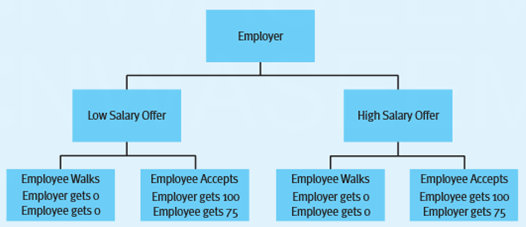Assignment Task:
Complete the following Problems in Chapter 15 in Managerial Economics: A Problem Solving Approach.
1. To Vote or Not to Vote
Mr. and Mrs. Ward typically vote oppositely in elections and so their votes "cancel each other out." They each gain two units of utility from a vote for their positions (and lose two units of utility from a vote against their positions). However, the bother of actually voting costs each one unit of utility. Diagram a game in which they choose whether to vote or not to vote.
2. Compatibility
Microsoft and a smaller rival often have to select from one of two competing technologies. The rival always prefers to select the same technology as Microsoft (because compatibility is important), while Microsoft always wants to select a different technology from its rival. Describe the equilibrium of this game.
3. Salary Negotiation
The below figure represents the potential outcomes of your first salary negotiation after graduation.
Assuming this is a sequential-move game with the employer moving first, indicate the most likely outcome. Does the ability to move first give the employer an advantage? If so, how? As the employee, is there anything you could do to realize a higher payoff?

Note - Clearly show how you solved these problems and provide a 100 word cumulative summary explaining all problems.
Are you exhausted of complex assignments and homework based on Managerial Economics? Managerial Economics Assignment Help, Homework Help service will relieve you at the most affordable prices.
Tags: Managerial Economics Assignment Help, Managerial Economics Homework Help, Managerial Economics Coursework, Managerial Economics Solved Assignments, Salary Negotiation Assignment Help, Salary Negotiation Homework Help